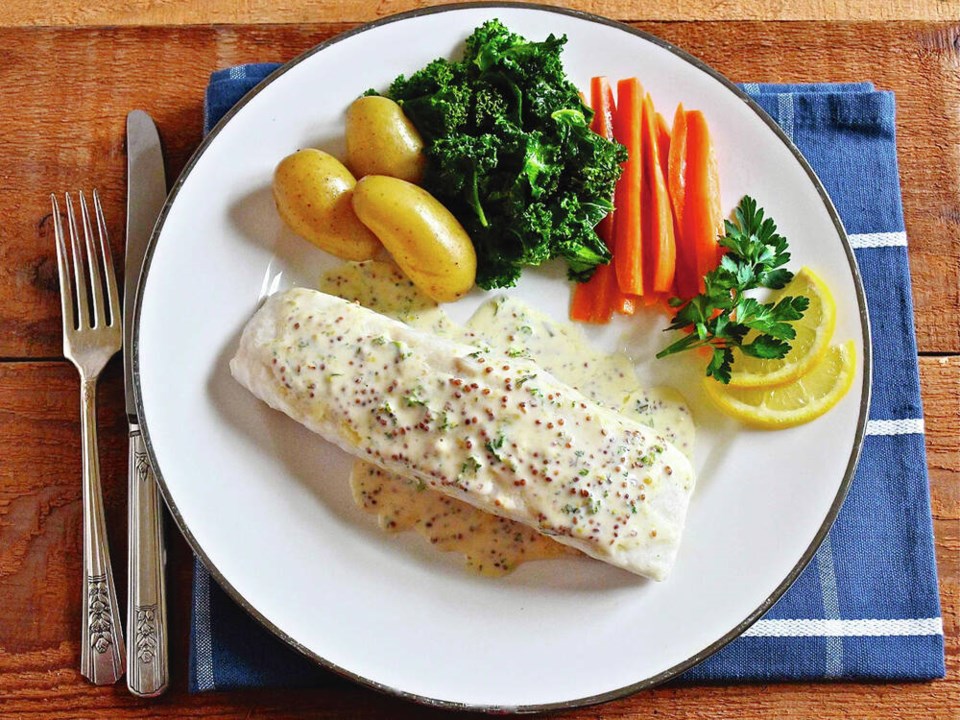Christmas is nice, but if you love fresh fish, now is the most wonderful time of the year.
That’s because B.C. halibut is in season and seafood stores and some grocery stores are offering it in all its glistening glory.
I say glistening, because that how the fillets, steaks and pieces of halibut you’ll see for sale should look when very fresh. They should also look firm, hold their shape well and have a mild sea-like aroma. If the halibut you see does not have those qualities, shop for it at another location.
Halibut can be prepared in a variety of ways. But when I desire something that’s not difficult to prepare, but is still quite decadent, I’ll buy halibut fillets, bake them and serve them with a cream sauce.
That’s exactly what I did in today’s recipe, and making the sauce for the fish begins with reducing some lemon juice in a pot with a bit of tarragon until the juice has concentrated and almost evaporated. Cooking and reducing acidic lemon juice in this way alters its composition. That, in turn, allows you to then add and simmer the next ingredient you add to the pot, whipping cream, without fear that it will curdle.
When the cream has simmered a short while, you finish the sauce by seasoning it with salt and pepper, and mixing in some whole grain Dijon mustard and chopped parsley.
Definitely not a complicated sauce, but definitively a sauce that will taste splendid when spooned over baked halibut fillets.
In fact, the sauce is so richly flavoured I kept the preparation of the halibut very simple.
The fillets were set in a baking pan, brushed with melted butter (or olive oil), seasoned with salt and pepper and baked.
Once plated and topped with the sauce, I accompanied the halibut with a mix of vegetables, which included fingerling potatoes, carrots sticks and wilted baby kale.
You can, of course, serve the fish with any other vegetables you think would work well with it. And, instead of potatoes, serve the fish with rice pilaf.
Going back to purchasing halibut, for the ultimate in freshness, it’s best to buy it the day you’ll cook it. If that’s not possible, though, if the fish is very fresh you could store it, removed from its store packaging and set in a covered container, in the coldest part of your refrigerator for one day.
My halibut recipe serves two, but it could be doubled or further expanded if serving a larger group.
Halibut with Lemon Mustard Cream Sauce
B.C. halibut fillets baked in a hot oven, plated and topped with a rich, creamy and tangy sauce.
Preparation time: 15 minutes
Cooking time: about 15 minutes
Makes: two servings
2 Tbsp lemon juice
• pinch or 2 dried tarragon or dill
1/2 cup whipping cream (see Note)
1 Tbsp whole grain Dijon mustard
• salt and ground white pepper, to taste
2 (5- to 6-ounce/140- to 170-gram) halibut fillets
2 tsp butter, melted, or 2 tsp olive oil
2 tsp chopped fresh parsley
• lemon slices and parsley sprigs, for garnish (optional)
Preheat oven to 400 F. To make sauce, place juice and tarragon (or dill) in a small pot and set over medium heat. Bring to a simmer and reduce juice to about 1 tsp. Add the cream, bring to a simmer, and simmer 30 seconds. Whisk in the mustard, and then season sauce with salt and pepper. Remove sauce from the heat, cover and set it aside for now.
Line a baking pan with parchment paper. Pat halibut dry with paper towel, and then set on the baking pan. Brush top of fish with the melted butter (or olive oil); season with salt and pepper. Roast halibut 10 to 12 minutes, or until cooked through (see Note 2).
When fish is five minutes or so from being cooked, mix the chopped parsley into the cream sauce. Set over medium-low heat and make sauce warm again.
When cooked, set a piece of halibut on each of two dinner plates. Top with the sauce, garnish with lemon slices and parsley sprigs, if using, and serve.
Note 1: If you don’t think you’ll use the remaining cream you have in the cartoon after using some of it for this recipe before its best before date, freeze it, to thaw and use at another time.
Note 2: When cooked, the halibut should feel slightly firm, not hard — a sign you have overcooked it — and not soft, a sign it’s not cooked through. When cooked, the flesh will also start to slightly separate into flakes.
Eric Akis is the author of eight cookbooks. His columns appear in the Life section Wednesday and Sunday.



